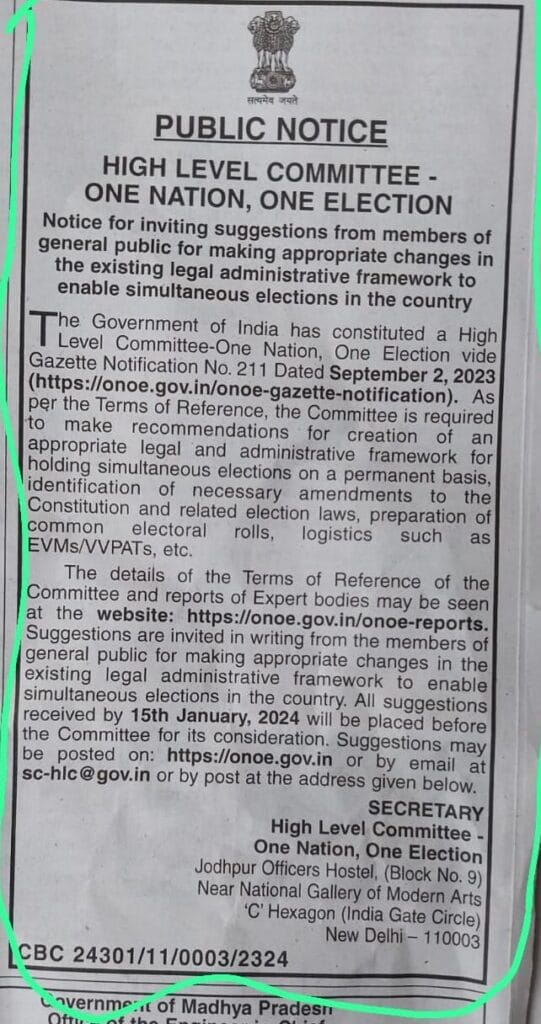In September 2023, the Government of India constituted a high level committee (HLC) to examine the feasibility of holding simultaneous elections to the Parliament (Lok Sabha), all state legislative assemblies, municipalities and panchayats in the country — a proposal floated as One Nation One Election. The panel, headed by former President Ram Nath Kovind, has now invited members of the general public to send their suggestions in writing for making appropriate changes in the existing legal and administrative framework to enable the same.
One can post suggestions on the Committee’s website or send an email to se-hlc@gov.in (as mentioned in the website*).
Suggestions may also be sent by post to:
The Secretary
High Level Committee, One Nation One Election
Jodhpur Officers’ Hostel (Block No 9)
Near National Gallery of Modern Art
‘C’ Hexagon (India Gate Circle)
New Delhi – 110003
According to the public notice issued for the above, all suggestions received by January 15th shall be taken up for consideration by the Committee.
Prior to this, the Committee had also written to six national parties, 33 State parties and seven registered unrecognised parties inviting their suggestions on the same. The Law Commission of India also made a presentation during a meeting of the Committee, sharing their suggestions and viewpoints on the issue.
The background
The proposal of ‘One Nation, One Election’ was floated by the ruling Bharatiya Janata Party during Prime Minister Narendra Modi’s first term that commenced in 2014. This was mooted primarily on the grounds that it would be more efficient than repeated elections through the year. It would minimise the periods of limbo that set in with the imposition of the Model Code of Conduct before any election. Proponents have alluded to the fact that with one election, the government can focus uninterrupted on long term policy making and execution.
It has also been argued that simultaneous elections will significantly reduce the costs associated with the electoral process. Former President Kovind, as head of the HLC, has himself been quoted saying that simultaneous elections would be beneficial for the people, as “revenue saved will be used for development work.”
Nevertheless, both practical and ideological concerns remain. Critics of One Nation One Election fear undermining of the principles of federalism and an undue influence on voting decisions, which may end up being guided by the national discourse, rather than policy, performance and matters pertaining to the state and local elected bodies.
However, given the terms of reference of the HLC, it is clear that focus of the Committee is not on debating the desirability of the policy per se, but rather on smoothening out logistical and legalistic hurdles to implementation. And it is on that front that it now seeks suggestions from citizens.
Read more: India’s 4,800 cities & towns need timely elections, simultaneous or otherwise
Key concerns around implementation
Fixing a start date for simultaneous elections to the Lok Sabha and all state legislative assemblies and local bodies is a huge conundrum in itself. But even if that were decided and arrived at through necessary amendments, another question looms: What happens if a state legislative assembly is dissolved prior to expiry of its natural term because of defection, or a no-confidence motion?
Implementation of the One Nation One Election policy thus calls for several key Constitutional amendments, especially with relation to the terms of legislatures. Legal experts have called out five areas where amendments are needed: Duration of Houses of Parliament (Article 83), Dissolution of the House by President (Article 85), Duration of state legislatures (Article 172), Dissolution of State Legislatures (Article 174), and Imposition of President’s Rule in a state (Article 356).
Another bottleneck lies in the availability of an adequate number of Electronic Voter Machines (EVMs) and Voter Verifiable Paper Audit Trail (VVPAT) machines. In a report published in The Indian Express in October 2023, the Election Commission itself spoke of the constraints on that front. The EC reportedly referred to the global shortage of semiconductor chips and spoke of the challenge in meeting additional EVM requirements for the Lok Sabha 2024 elections itself, let alone simultaneous elections to all other legislatures and local bodies. The latter would also require creation of common electoral rolls.
The HLC will factor in suggestions from the public as it looks at creating a framework to address the above issues and hold simultaneous elections on a permanent basis.

Also read:
- From ballot papers to EVM and NOTA, a brief history of Lok Sabha elections
- Video explainer: How effective is the Model Code of Conduct, really?
- Op-ed: Why it is important to empower our city governments, now more than ever
*Update: The email address has been updated to reflect the information mentioned in the ONOE website.
Ban EVM Vote on ballet paper
Ban EVM
EVM machines are prone to manipulation, and hence should be banned. Vote on ballet paper is the time tested way to conduct polls and is practised by most developed countries. One nation one election is absolutely impractical. The committee should apply their mind and the proposal should be rejected.
One Nation one election absolutely impractical